Review: Saethu Cwningod / Shooting Rabbits
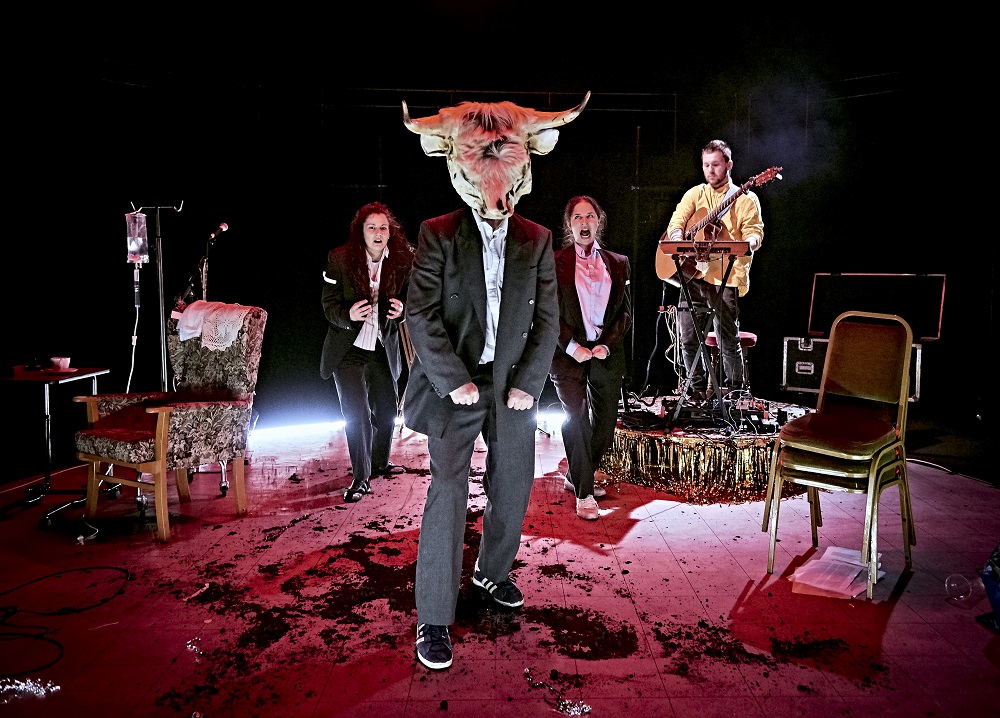
Emily Garside
Powderhouse are Sherman Theatre’s newest company in residence, and Saethu Cwningod/Shooting Rabbits is their debut production. A bilingual company, they are Chelsey Gillard and Jac Ifan Moore. Both have a history with Sherman, having developed their careers in part via the Sherman Theatre’s sector-leading scheme the JMK / Sherman Directors Group supported by the Carne Trust. They now move into the next stage of their careers and partnership with the Sherman with their bilingual company, which will also be touring to Theatre Clwyd, Aberystwyth Arts Centre and The Miners’ Theatrau Sir Gar.
For their first production, Powderhouse have chosen to explore a perhaps relatively unknown historical connection between Wales and Spain. During the 1930s, when Spain was in a state of Civil War, many Welsh men and women travelled to Spain to fight against Fascism. Known as the International Brigades, they were joined by others from across Europe supporting the Spanish as they stood up against the Fascist leaders during the war.
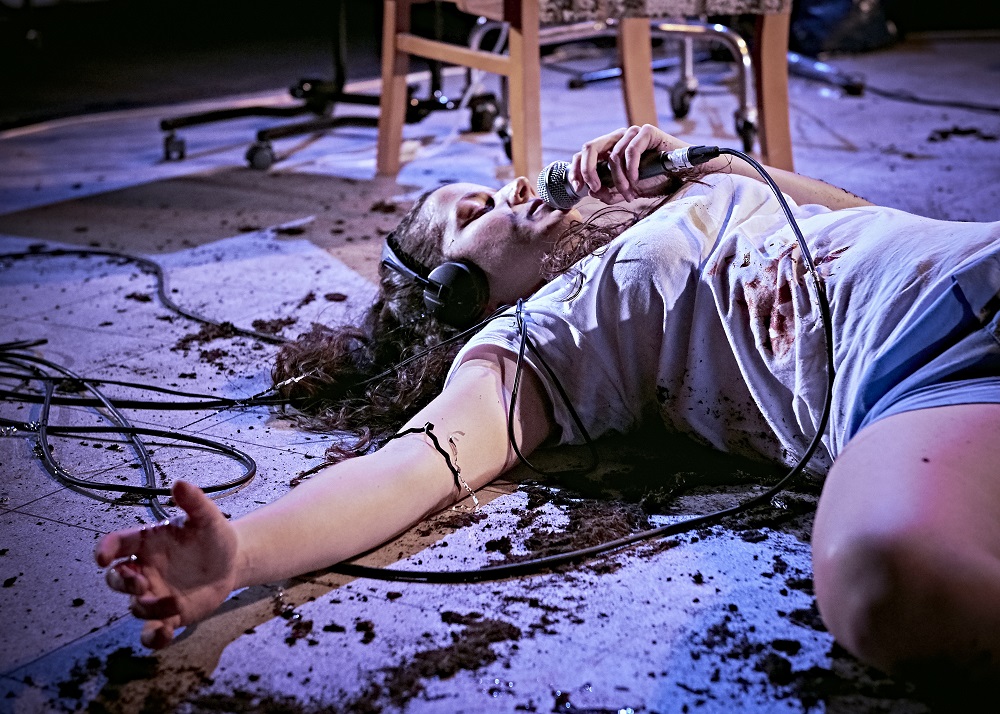
The military rising on 16 and 17 July 1936 against the democratically elected Popular Front Republican government led immediately to the Spanish Civil War. The response in Wales was largely provided by the South Wales Miners’ Federation and the Communist Party and eventually supported by a broad coalition including the Labour Party, Liberals, some Welsh writers, academics and teachers. They were Communist or Labour in sympathy, largely from the central valleys of the Rhondda, Cynon and Taff although there were also volunteers from the north Wales coalfield, the coastal towns of the south and rural areas. There was- as Shooting Rabbits notes- a kind of empathy and a shared sense of place, between the people of Wales- especially those of rural mining communities- and the people of Spain.
What reason for this story now then? It isn’t much of a stretch to see the allegory between then and now. A glance across Europe and the rise of far-right wing governments. Fascist leadership taking hold insidiously and otherwise worldwide. The question Powderhouse are asking, is ‘what would we risk now?’ and alongside that, asking where does Wales sit in its relationship with Europe at a time of crisis?
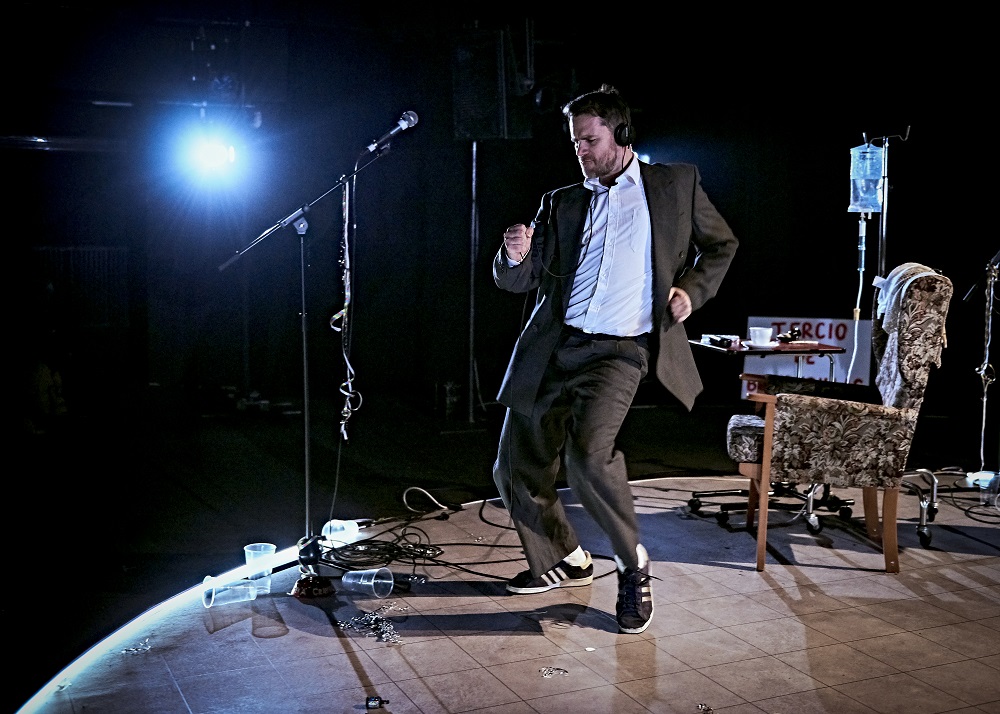
In their telling, an impassioned young man travels to Spain to fight for his beliefs. And they ask would you risk everything for democracy?
In this devised piece the three performers bring together Welsh, Spanish and Northern Irish identities to explore the themes of Democracy, Identity and how far we’d go for our beliefs. Opening with a comedic moment in which Neal McWilliams, who as an actor is asked to play his monologue first ‘less Irish’ then ‘more Irish’ (he’s Northern Irish) segues into a (deliberately) heavy-handed comparison between Wales and Northern Ireland, alongside some interesting observations on The Troubles from an outside perspective. It’s a moment that seems to set a scene, give some commentary perhaps on the perception of identities across Europe, perhaps our ability to make judgements on nations we do not know. But it is a moment that seems a little at odds, a little incongruous with the rest of the piece.
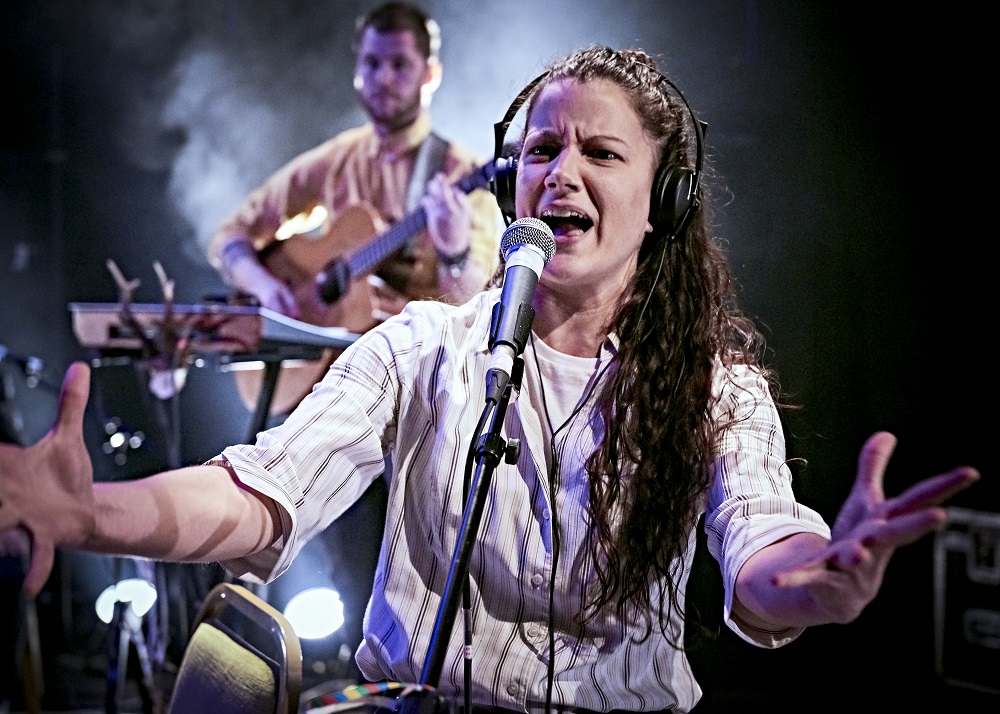
The storytelling of the piece, the narrative structure is non-narrative, and wholly theatrical in nature. It’s thoroughly engaging and entertaining as it is moving and thought-provoking. But it is also not easily understood. Perhaps deliberately, perhaps purposefully obtuse to challenge and give space to audiences to understand. However, given that- with some research- the piece is based on historical events, is drawing directly on lived history and politics, it lacks a certain clarity that shouldn’t rely on an audience’s curiosity to google after. For some it may not even be clear that the piece is based on real events. The point is still made, the story still told without, but perhaps some level of confusion, and an easier making of some of the points could have been made with a little more literal context.
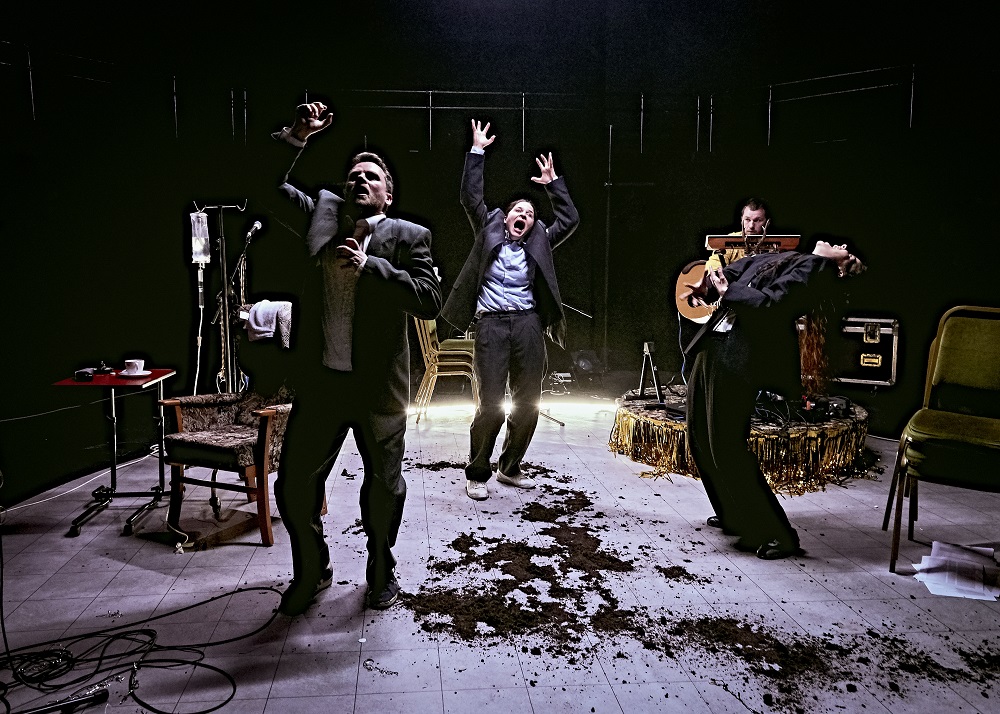
The performances, and the content itself are engaging, urgent and unapologetically theatrical. And for all these the work of Powderhouse, and the team of directors and performers who created this, should be praised. The multi-lingual performers- Welsh Gwenllian Higginson joins McWilliams, along with Spanish Alejandra Barcelar Pereira. There is a use of all three languages integrated across the piece, sometimes with direct translation, sometimes with none at all. Though understanding of the spoken word will vary according to proficiency of language, understanding of the piece is not compromised. And the three languages are given equal weighting in terms of performers and in terms of clarity of communication with the audience. And this is a huge leap in bilingual performance, it is in itself a political statement within the piece- there doesn’t feel like a judgement on the audience for not understanding Spanish, nor for not understanding Welsh or English, simply all three languages exist alongside, sometimes on top of each other, and all contribute to the story and communicate with the audience.
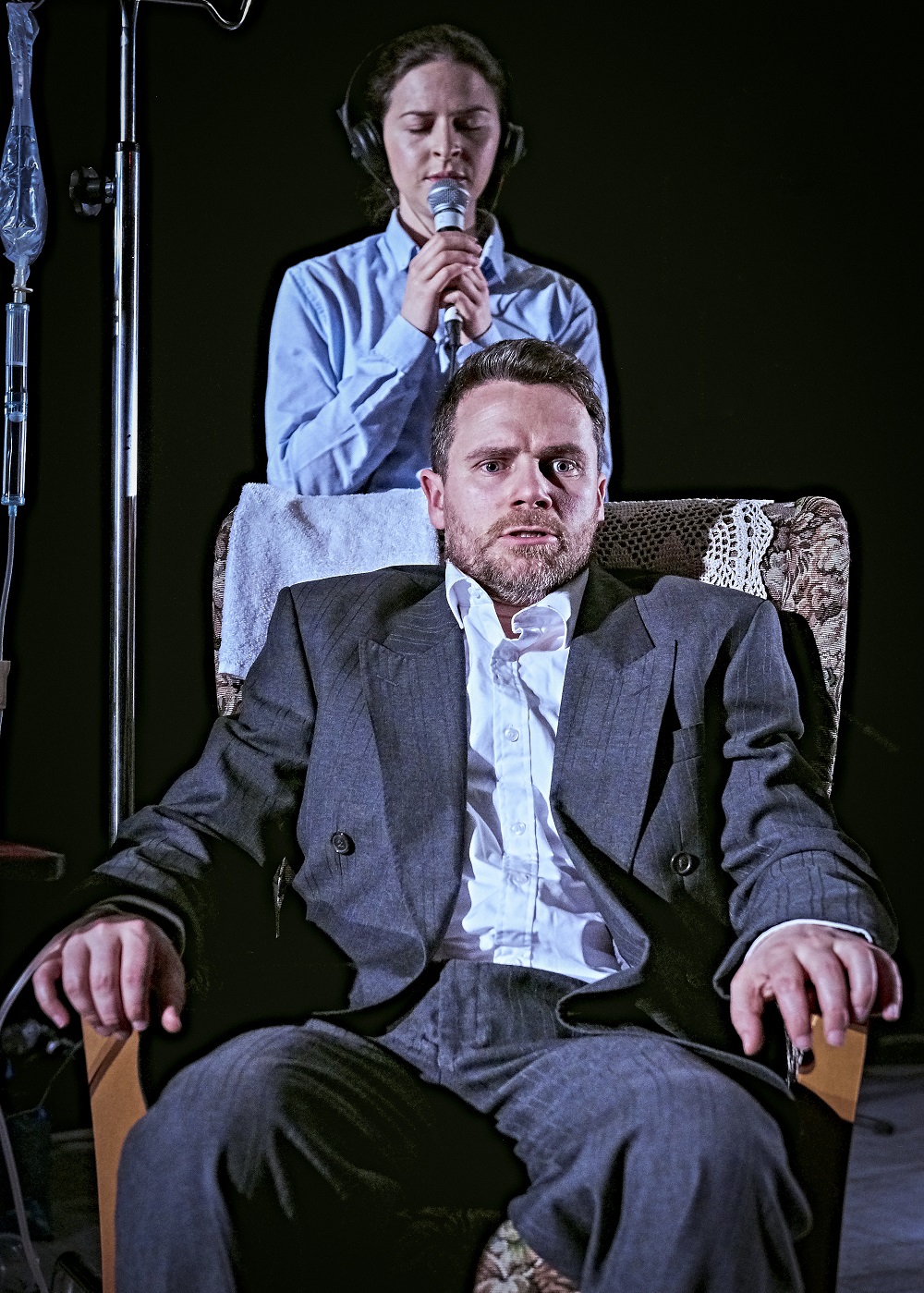
The title of the play is derived from the quote “If I can shoot rabbits/then I can shoot fascists” a quote from Tom Thomas, an unemployed miner from Bedlinog, who was asked why he had volunteered for the International Brigades had answered “If I can shoot rabbits, then I can shoot fascists”. It is perhaps better known now as a lyric in The Manic Street Preachers 1998 single ‘If You Tolerate This Your Children Will be Next’. Drawing on a long-standing political pop culture reference grounds the piece in a certain kind of cultural dialogue for those who remember it. And in reaching back to 1998 also recalls a now almost halcyon political climate to contrast with. But this, and the use of music- and revolutionary song- in the piece pull together Wales, and performance as part of the counter culture across decades.

Music is also integral to the piece. Sam Humphreys of traditional Welsh folk band, Calan, provides a soundtrack combining guitar and electronic elements, and he is as integral a part of the production as any of the actors. His combination of acoustic accompaniment and electronic music and ambient sound functions as a ‘second script’ to the piece. At times yes, it is accompaniment but more often than not it is as integral to the storytelling as the performers. Providing emotional, narrative and even at times comedic cues. While Humphreys is often removed from not interacting directly with the performance the audience never forgets he is part of it. And despite this being billed as a trilingual piece- English, Spanish and Welsh, actually it is arguable that what they have created is a fourth layer of ‘language’ using music.
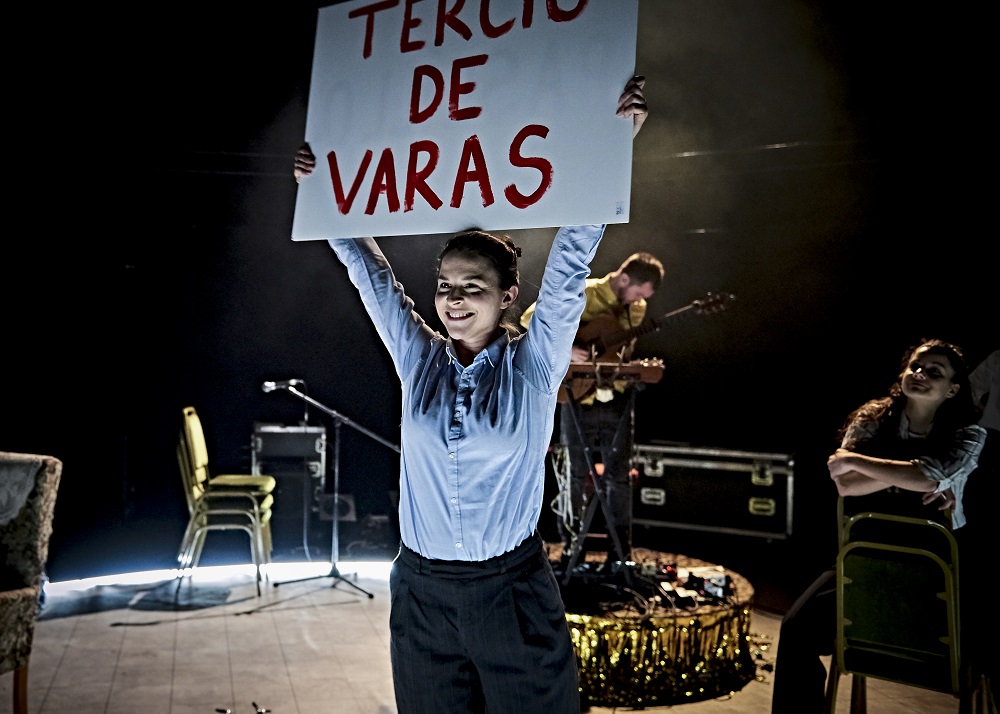
The use of sound is one of the key 360 degree elements of what Powderhouse have created. Within the studio at the Sherman they’ve created a pocket of sound, movement and dialogue that for the performance becomes its own world. There is a particular language cohesion across all of this- sound, movement and dialogue- which transcends the actual language of the piece.
Saethu Cwnigod/Shooting Rabbits is a messy production- literally the stage ends is a deluge of mess left by the performance. It’s messy in that it encompasses a broad range of ideas, theatricality, and concepts, languages and styles. These never compete for attention but butt up against and bleed into each other. It’s at times unwieldy in it’s messiness- particularly in the middle of the piece things seem to lose direction and focus. But the political ideas it grapples with are messy also. Life is also messy and difficult to condense into a bite sized chunk. And while in the execution perhaps finer points of what this intelligent company are trying to convey get somewhat lost in the noise, the broader issues still ring through. Equally there is a lot going on theatrically, it’s broad experimental and unapologetic about that. And like the unapologetic politics that is also to be praised even if it too isn’t always polished or exacting. And it’s ambition in both respects is to be admired.
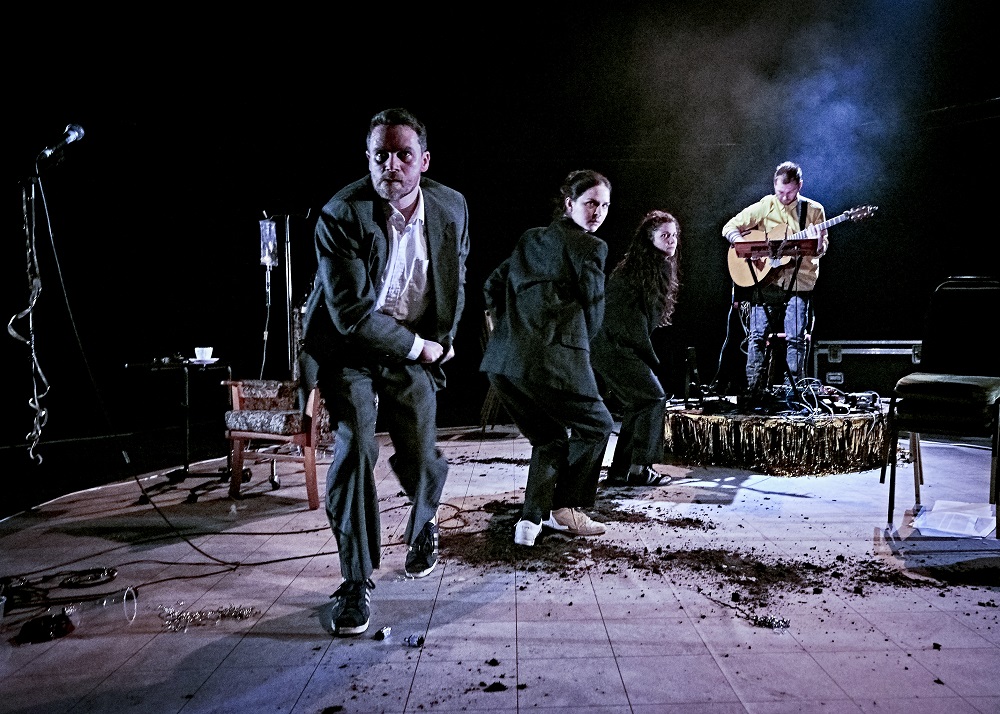
Saethu Cwningod/Shooting Rabbits continues at Theatre Clwyd, Aberystwyth Arts Centre and The Miners’ Theatrau Sir Gar.
Coming up in Wales next week:
Louder is not always clearer
Johnny Cotsen returns with his work exploring being a deaf man born to hearing parents. Louder Is Not Always Clearer’ is an honest portrayal of the vulnerability of a deaf man, created and performed by a deaf man. For a hearing audience it is an illuminating and emotional experience. For deaf audience members the show is a familiar tale of misunderstanding and isolation. For all audiences it is a humorous and at times moving story of one man’s attempt to cope, to fit in and be accepted.
Chapter: 8th May-11th May.
https://www.chapter.org/louder-not-always-clearer-0
Robinson: The Other Island
Mathilde Lopez takes on classic literature with a twist. Using headphones and ASMR experience. Castaway in a digital age: Give it a Name reimagine Robinson Crusoe in the novel’s tricentennial year as a hypnotic evocation of solitude, delving deep into the fantasy of the island, the violence of colonisation and the act of reading.
Chapter 9th-18th May
https://www.chapter.org/robinson-other-island
We can’t run Nation.Cymru without your help! If you support the development of an independent Welsh media for the people of Wales, please donate now!
Support our Nation today
For the price of a cup of coffee a month you can help us create an independent, not-for-profit, national news service for the people of Wales, by the people of Wales.





